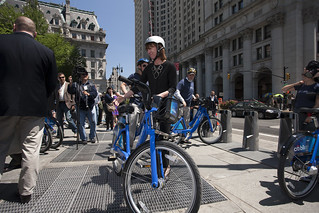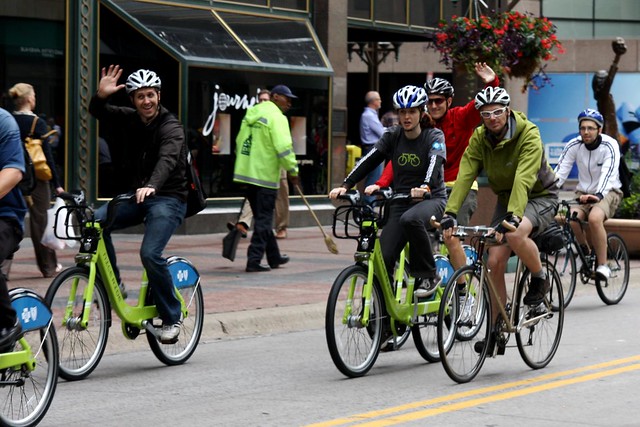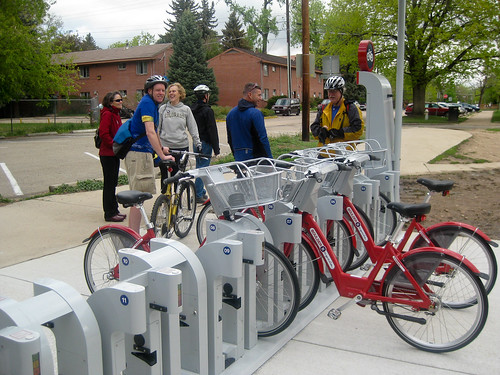A Wall Street Journal report last week that New York City’s wildly popular bike share system has been operating in the red has, understandably, rattled the Portland transportation world as we wait for a similar system here.
I’ll start by rounding up the burst of media coverage, then offer some quick analysis.
The Journal report last Thursday, which we linked to in this week’s Monday Roundup, kicked things off. An Oregonian news roundup followed focused the blame on Alta, the Portland-based company that manages Citi Bike and has the contract for Portland’s future system. A follow-up editorial from the Oregonian called on the city to scrap its plan and put the money to other bike projects, seemingly misreading a recent bike sharing study to draw the conclusion that a Portland system is “almost certain to require a hefty annual operating subsidy from Portland taxpayers.”
On Monday, Alta followed up with a statement of its own adding that it is “talking to investors about expanding our own operations,” which might or might not mean it’s still trying to purchase the bankrupt Montreal-based equipment and software supplier whose problems have been entangled with Alta’s.
On Thursday, Oregon Public Broadcasting did a segment focusing on the subject, and scored a call-in interview with Alta executive Mia Birk, who’d been publicly silent until then. (She avoided saying anything new.) I was a guest, too, and talked about two keys to profitability for bike share systems: dirt-cheap operating costs and lots of tourists.
Readers may be hoping for signal in all this noise. I’ll give it a shot.
1) It is really bad for Alta that Citi Bike is losing money.
Some of the NYC system’s huge popularity depends, presumably, on the fact that Alta has been willing to operate the system in the red in order to maintain quality — sending battery-replacement crews around to each bike share station, for example, to make sure they’re fully charged. That’s the sort of thing Alta’s software should be doing, if it worked. This is an example of the ways that it doesn’t.
Read the WSJ piece closely and you’ll see Alta’s software problems elsewhere: in tourists’ struggle to buy the 24-hour passes that are so lucrative to a bike share system; in the failure of the system to expand as anticipated. This is probably why Alta pushed its software supplier toward bankruptcy and later signed a new deal with the maker of the software behind Alta’s real crown jewel: Capital Bikeshare in Washington DC. If Alta can’t get a working prototype out of that deal very soon, it’s likely to start losing bike share contracts — not just Portland’s but the renewals from its existing cities, like Boston.
The New York Times reported yesterday that Alta is in a dispute with the city over whether it has the right to raise annual Citi Bike memberships from $95 to $140. Raising the price of a popular product would be nothing new, but you don’t see 47 percent price hikes every day.
2) Portland Bike Share will sometimes need public money, but probably not much from local budgets.
The Oregonian editorial board either misreads or misrepresents a recent study of bike share costs. It quotes the report: “while subscription and user fees provide a stable revenue source, rarely do they provide enough revenue to ensure that the system is financially self-sustaining.”
True. But this doesn’t mean, as the editorial suggests, that Portland’s system will require a “hefty annual operating subsidy from Portland taxpayers.” It means bike share will require private commercial sponsors, which Portland, like so many other cities, has already lined up.
Portland bike share probably won’t have money to add new stations without bursts of public money (federal, state or local). And it’s also possible that Portland’s system will for some reason turn out to operate in the red, unlike the two systems most like ours (Minneapolis and Denver). If that happened, the city could then decide whether to keep the system afloat for a few hundred thousand dollars a year.
It’s 100 percent fair to argue that this money should be spent on other things. But even if Portland bike share someday has a public operating subsidy of $300,000, a new public transit system that provides fast, clean, cheap, healthy circulation for half a million trips a year looks just fine compared to (for example) Portland Streetcar’s operating subsidy of about $6 million a year for about 6 million trips.
Efficiency (not peer pressure, as Oregonian editors like to impishly suggest) is the reason U.S. cities are rapidly adding bike sharing systems.
3) No, Portland is not too bike-friendly for bike sharing to be useful.
Yes, most Portlanders already own a bike. And 52 percent of New York taxi passengers already own cars.
There are lots of reasons to have doubts about the particulars of Portland’s bike share plans, but uselessness isn’t one of them.
Correction: An earlier version of this post overstated the size of the Portland Streetcar’s operating subsidy.





